In 2020, the following five research projects have been funded through our Venture Grants Scheme worth almost $2.3 million over two years. The Venture Grants program is designed to support innovative researchers with courageous ideas who would not be able to attract conventional funding.
“It’s important we fund bold, innovative research that could achieve the next breakthrough in cancer prevention, treatment and diagnosis. These projects are pursuing new and imaginative ways to improve cancer outcomes for all Victorians.” - Todd Harper, CEO
Project one: Developing new ways for tracking the advertising of products known to increase the risk of cancer
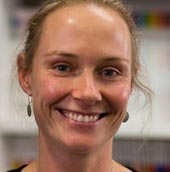 Researchers: Dr Kathryn Backholer, A/Prof Asim Bhati, Prof Chee Peng Lim, Prof Anna Peeters, Prof Colin Bell, Dr Becky Freeman, A/Prof Michael Johnstone, Ms Christina Zorbas and Ms Jane Martin
Researchers: Dr Kathryn Backholer, A/Prof Asim Bhati, Prof Chee Peng Lim, Prof Anna Peeters, Prof Colin Bell, Dr Becky Freeman, A/Prof Michael Johnstone, Ms Christina Zorbas and Ms Jane Martin
Project location: Deakin University
Project outline: It is known that a third of cancers are preventable and that alcohol, tobacco, and the consumption of a diet high in sugar, salt, and/or fat are major preventable risk factors. Exposure to advertising for these products during childhood has been proven to have lifelong influence, thereby increasing lifetime cancer risk. The need for this to be curbed and regulated to help reduce cancer incidence and mortality is therefore critical. Using complex systems and artificial intelligence, this project aims to revolutionise the way in which unhealthy advertising to children can be captured and monitored.
“Quantification of unhealthy advertising exposure to children and an understanding of how children engage with various forms of advertising and marketing strategies will support the formulation of effective regulatory action to protect children from the economic exploitation of products known to increase the risk of cancer”
Project two: Helping everyone by studying rare “super-survivor” individuals who are immune to the spread of cancer.
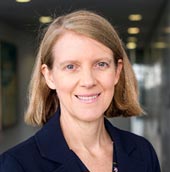 Researchers: Prof Clare Scott, Dr Kristy Shield-Artin, Prof Magdalena Pebanski, Dr Justin BedÖ, Prof Tony Papenfuss, Prof Susan Ramus
Researchers: Prof Clare Scott, Dr Kristy Shield-Artin, Prof Magdalena Pebanski, Dr Justin BedÖ, Prof Tony Papenfuss, Prof Susan Ramus
Project location: The Walter and Eliza Hall Institute of Medical Research.
Project outline: This project will investigate a small group of people who have developed, and survived, three or more completely unrelated cancers in their lifetime. Critically, these people tend to be diagnosed with each cancer early, before it has spread. These individuals provide us with the opportunity to identify new genes that drive cancer development, and which may be used to halt the progression of cancer or to find new roles for known cancer predisposition genes. Importantly, do these ‘super survivors’ have unique features that protect them, and could this inform the ability to control cancer spread (‘metastasis’) in others? By analysing a significant bank of tumour samples and clinical data, the project team expects to find clues and patterns in ‘super survivors’ that will lead to improved new life-saving treatments.
“By studying ‘super survivors’, we hope to produce new treatments to prevent cancer recurrence. This has the potential to dramatically reduce the cancer burden worldwide over the next decade and beyond.”
Project three: Cas 13 mRNA silencing - a new approach to treating incurable childhood cancers
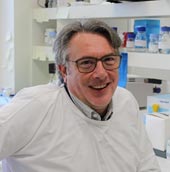 Researchers: A/Prof Paul Ekert, Prof Joe Trapani and Dr Mohamed Fareh
Researchers: A/Prof Paul Ekert, Prof Joe Trapani and Dr Mohamed Fareh
Project location: Peter MacCallum Cancer Centre
Project outline: Cancer in both adults and children is caused by changes, or mutations, that occur in the genes of previously normal cells. These changes alter the nature of cells, such that they divide and grow in an uncontrolled way. Genome sequencing – the technical ability to read the mutations in cancer cells – has revealed the broad range of mutations that drive paediatric cancers. Linked to Australia’s national ‘Zero Childhood Cancer’ program (the largest and most ambitious program to deliver personalised medicine to children with high-risk cancers), this project’s primary goal is to provide a proof-of-principle way of directly targeting these mutations therapeutically.
“Tailoring treatments that fit the individual profiles of a cancer has the very great potential to improve survival chances and diminish treatment side-effects.”
Project four: Exploiting network vulnerabilities to devise effective combination therapies against breast cancer
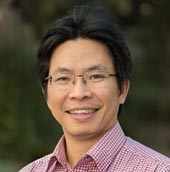 Researchers: Dr Lan Nguyen, A/Prof Helen Abud, Dr Ralf Schittenhelm and Prof Roger Daly
Researchers: Dr Lan Nguyen, A/Prof Helen Abud, Dr Ralf Schittenhelm and Prof Roger Daly
Project location: Monash University
Project outline: Our project takes a novel approach to the complex issue of drug resistance in the treatment of breast cancer. Breast cancer cells are known to ‘re-route’ to escape the tumour-killing effects of targeted therapies, but exactly how this happens and how it varies in different patients remains unknown. Widespread resistance to single therapy agents has led to increased use of combination therapies (‘cocktails’ of existing drugs), but there is no reliable way to predict which from hundreds of possible combinations will be effective for individual patients. Leveraging predictive computational modelling, our project will produce critical insights into the mechanisms of cell resistance and identify effective new combination therapies for breast cancer.
“Our project is well poised for rapid research to the clinic due to the efficiency of the computational approach and opportunities for drug repurposing”
Project five: Targeted reprogramming of prostate cancer
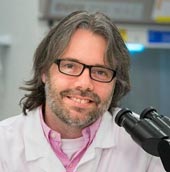 Researchers: Prof Jose Maria Polo, A/Prof Renea Taylor ,Dr Natalie Lister,and Dr David Pook
Researchers: Prof Jose Maria Polo, A/Prof Renea Taylor ,Dr Natalie Lister,and Dr David Pook
Project location: Monash University
Project outline: The development of treatments has conventionally involved targeting factors with high expression in cancer cells, based on the theory that high expression must equate with importance to growth and survival. However, this isn’t always so and has led to the pursuit of false targets. Cancer cell survival is actually controlled by ‘master regulators’, which may be expressed at quite low levels but are nevertheless the most potent and influential. Predicting a cell’s master regulators from thousands of potential candidates is time consuming and costly. Our project proposes an innovative mathematical approach to identifying these factors efficiently, in turn enabling the development of new targeted treatments for aggressive prostate cancer.
“Our approach will match patients to drugs that will target their specific type of cancer, rather than ‘broadly treating all cancers’ in the way other treatments such as chemotherapy do.”